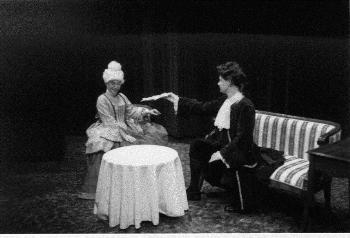
News
Progressive Labor Party Organizes Solidarity March With Harvard Yard Encampment

News
Encampment Protesters Briefly Raise 3 Palestinian Flags Over Harvard Yard

News
Mayor Wu Cancels Harvard Event After Affinity Groups Withdraw Over Emerson Encampment Police Response

News
Harvard Yard To Remain Indefinitely Closed Amid Encampment

News
HUPD Chief Says Harvard Yard Encampment is Peaceful, Defends Students’ Right to Protest
Summer Theater Takes Center Stage

Amadeus, the first production of Harvard Radclife Summer Theater (HRST) is ending its run this weekend, opening the stage for the summer’s two final shows.
After only two weeks of rehearsals for seven actors playing multiple roles, Amadeus opened to a full audience in the Loeb Experimental Theater on June 28. The last performance will be tomorrow evening.
Amadeus, written by Peter Shaffer, tells the story of composer Antonio Salieri and his jealousy for Wolfgang Amadeus Mozart in the Vienna Court. It features what HRST Publicity Coordinator Maggie S. Lehrman ’04 called “lavish costumes” and a “simple set.”
“It’s a fantastic, fun, compelling story,” said Amadeus director Kenneth P. Herrera ’03 said. “It’s exceeding my expectations every night that it’s out there.”
So far, the show has attracted substantial audiences, almost selling out on several nights.
Herrera, who serves as Harvard Radcliffe Dramatic Club (HRDC) Vice-President during the school year, attributed the success of Amadeus to a hard-working cast that mastered the show in a short time.
“Definitely the biggest challenge was time,” he said, saying the set was put together in three days. “[But] I have a great group of actors, and they really worked hard.”
The HRST company, composed of 30 mostly-Harvard undergraduates, will live on campus until mid-August, when its final production hits the stage.
Throughout the summer, the company produces three shows, with each member playing various roles, on and offstage.
Five days after Amadeus closes, The Blue Room, written by David Hare and directed by Helen C. Estabrook ’03, will open, drawing audiences to a two-person performance by Julian Reyes and Abigail Ladd, with themes of what Lehrman called “intimacy and infidelity.”
“It’s ten vignettes.” Estabrook said. “Each one of them is a different couple, dealing with issues of their relationship.”
The cast of two, who plays five characters each, has been what Estabrook called “an exciting challenge.”
“It’s difficult working with a small cast,” she said. “If someone gets a little tired, everyone gets a little tired.”
But she said she believes that the show will be a success.
“The rehearsals are going really well,” she said.
In contrast to the drama of The Blue Room, HRST’s third show, Psycho Beach Party, written by Charles Bush and directed by Andrew Boch ’03, is a comedy about “beach chicks trying to get boyfriends,” Lehrman said.
“It’s the insane play of the season,” she said. “It’s the most bizarre of the three shows.”
Psycho Beach Party, which will run from Aug. 2 until Aug. 16, presents its own challenges as a comedy.
“You just have to keep it fun and fresh,” Lehrman said.
HRST also must work hard to draw audiences from a different population than usually attends HRDC performances.
“We have to draw more of a community audience,” Lehrman said. “We pick the shows with a more community audience in mind.”
The company, led for the summer by producers Daniel A. Cozzens ’03 and Naomi R. Krako ’03, also reaches out to Harvard Summer School students.
HRST members said they enjoy the challenges and the artistic freedom that the summer allows them.
“We put on more complex shows and more detailed shows that required more work,” Lehrman said. “But it’s also more fun because we don’t have 18 other commitments and we can spend the time we want to spend.”
—Staff Writer Claire A. Pasternack ’05 can be reached at cpastern@fas.harvard.edu.
Want to keep up with breaking news? Subscribe to our email newsletter.
